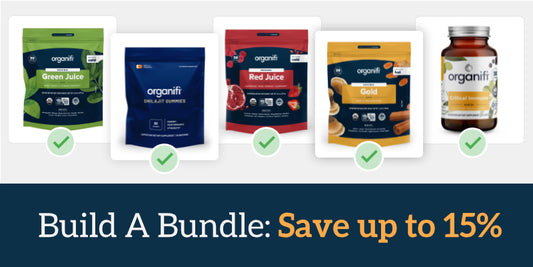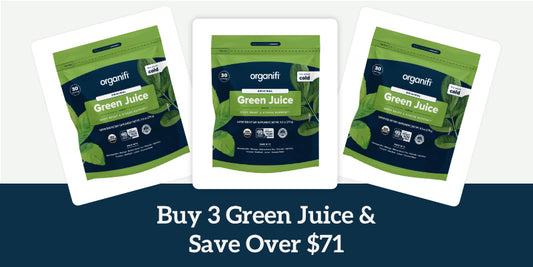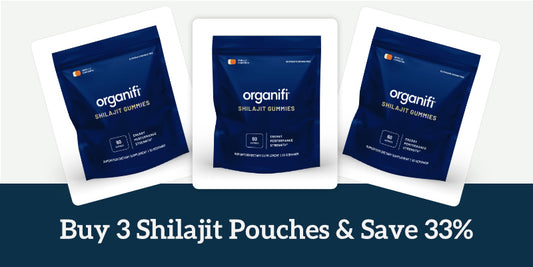Do anti-aging supplements really work or are they just a hoax?
What’s the deal with anti-aging products?
It’s pretty safe to say that, since the beginning of time, we have been looking for ways to slow down aging. From the search for the mythical fountain of youth (hi there Captain Sparrow) to literally bathing in the blood of young women, we’ve done some questionable things as a species to keep ourselves looking young and pretty.
Fortunately, you don’t have to go as far as Countess Elizabeth Báthory of Hungary -the infamous blood-bather - to age gracefully; the secret to eternal youth is a combination of nutrition, self-care, and mindset. First of all:
Aging is not a bad thing - it’s a privilege!
We get so caught up in our fitness goals, Instagram feeds, and unrealistic magazine-cover beauty standards, that we often forget every single day we get to live is a gift! A rare, fantastic, and unrepeatable gift.
Now, that’s not to say we don’t like to age gracefully; in fact, at Organifi, we like to age healthily. There’s a difference! There’s nothing wrong with wanting to slow down the signs of aging (we get it; nobody likes those sun spots on our face, arms or neck,) but there’s also nothing wrong with aging per se.
Aging is a natural process and regardless of how many candles we blow out, we can still look - and feel - amazing.
It’s a matter of what we put into our bodies and how we treat ourselves on a regular basis. Healthy aging can look like:
- Glowing skin that matches - or even masks - your age
- Energy to keep up with your day
- Supple joints and flexibility
- Hopeful and optimistic thinking
- Restful sleep and easy relaxation
- Regular bowel movements (we had to go there!)
Anti-aging supplements are nutritional leg-ups for healthy aging.
Essentially when the inside is working properly, the outside reflects it joyfully. If you’re interested in anti-aging supplements, what works, what doesn’t, are there reishi mushroom benefits for skin? This post is for you, just in time for the healthy aging month too!
Are there Anti-Aging Supplements or Foods?
According to research, the relationship between nutrition, anti-aging supplements, and skin remains “controversial” but the science seems to support one strategy universally:
Protecting skin from cell oxidation by supporting the body’s own antioxidant system is the most effective form of “anti-aging.”
This process can be achieved by feeding our cells with the same “antioxidants containing products that are normally present in the skin.” Essentially, consuming nutrients that support pre-existing vitamins, minerals, peptides, and antioxidants in the body, is the healthiest approach to graceful aging.
The research affirms that:
“Fruit and vegetable consumption may represent the healthiest and safest method to maintain youthful appearing skin”
This means that foods rich in antioxidants may be considered anti-aging; and certain anti-aging supplements may support that process with their own antioxidant nutrients. It’s important to note that no supplement can ever replace whole foods and balanced nutrition.
In short: yes there may be anti-aging supplements or anti-aging nutrients, but they are not miracle workers. They’re a way to support your diet and help your body produce its natural self-healing and self-sustaining molecule.
Some of these foods could be cruciferous green vegetables, reishi mushrooms for skin, berries, acai, citrus foods, and more.
Anti-Aging Supplements 101
There are many types of supplements out there with various levels of efficacy, but all try to reduce or minimize oxidative stress; a process where free radicals (loose electrons) attach themselves to healthy molecules and damage them by breaking their original structure. Anti-aging supplements are nutritional aids that help fight the visible and invisible signs of aging.
Anti-aging supplements are vitamins, minerals, antioxidants, and peptides that support the chemical production of your body’s natural defense and repair systems.
These may contribute to:
- Reduced facial lines and wrinkles
- Plumper facial complexion
- Reduced joint pain
- Improved skin elasticity
- Stronger joints or bones
- Smoother skin
- Improved cardiovascular health
- Better athletic performance
- Enhanced immune function
- Higher energy levels
Anti-Aging Supplements vs. Anti-Aging Creams and Products
So, do anti-aging supplements work? What about creams and serums?
Topical Anti-Aging Products:
Anti-aging creams and serums may only temporarily replenish the skin through contact and absorption. But, given that many vitamins and antioxidants are not easily absorbed or oxidize quickly when exposed to the elements (sometimes while they go from the bottle to your face), they may not be effective in the long run.
Many times the same compound, like rosehip oil, can be effective topically and via ingestion. We often hear people ask “what is rosehip good for?” when they find out it’s also available in an edible format. Topically, it helps reduce the appearance of scars, acne, and dullness. Ingested, it may help cells regenerate from the inside-out.
Anti-Aging Supplements:
Serve as a support mechanism for dietary insufficiencies and may have longer-lasting effects than topical anti-aging products, but take longer for positive results. For example, topical application may result in a near-immediate glow in dry or dull skin, but will quickly fade away throughout the day.
Anti-aging supplements may not show same-day results but could have long-term effects as their components nourish cells, boost natural collagen or antioxidant production, and build up over time as you take the supplement in addition to a healthy diet and lifestyle.
You may want to support your supplements with a hormone balancing diet, so you can adapt your dietary intake to your needs decade by decade.
Anti-Aging Supplements: Nutrients to Focus On
Some nutrients have been shown to reduce the effect of UVB rays (sunlight) damage and prevent or repair oxidative stress. These are the anti-aging nutrients backed by science that you should look for in your anti-aging supplement of choice.
Vitamin C:
It’s the most common antioxidant in the skin, it has been shown to reduce sun damage, boost collagen synthesis, and repair elasticity.
Vitamin E:
A very important antioxidant for skin, studies reveal that it is photo-protective, may prevent sunburn cell formation, support elasticity, and more. Like Vitamin C, Vitamin E is more effective when ingested because its stability is compromised as soon as the product is opened and exposed to air or light.
Selenium:
A mineral that protects against skin oxidation and may have anti-cancer properties as well.
Collagen:
What is collagen? A protein necessary to create, repair, and upkeep skin, hair, nails, joints, bones, and more; it helps in the formation of most body tissue.
Reishi Mushrooms for Skin:
You may have heard about Reishi for stress, but what about reishi mushrooms for skin? This powerful little superfood has earned the moniker “mushroom of immortality” due to its power to help slow down aging. A powerful adaptogen food it helps the body manage oxidative stress, energy, it’s remarkably rich in antioxidants and replenishes your skin from the inside out.
Rosehip Oil:
You may or may not know what rosehip is good for, but you may already know it's a topical oil. Rosehip is good for collagen synthesis: has 80X more Vitamin C than lemons, Vitamin A, E, Carotenes, Flavonoids, and Fatty Acids.
Omega 3 Fatty Acids:
Available in fish oil, algae oil, and other supplements, they help protect skin from UVB ray damage, help manage skin conditions like eczema, inflammation, and rashes.
Polyphenols:
Plant-based compounds and antioxidants found in brightly colored foods like blueberries, red cabbage, strawberries, raspberries, coffee, cacao, and more. They have anti-oxidation properties that help support brain activity, skin elasticity, and immune system function.
Complete Protein:
Just like Reishi mushroom's benefits for your skin, protein has surprisingly helpful anti-aging properties. As muscles break down over time through Sarcopenia protein supports muscle growth and maintenance. We recommend plant-based complete protein to avoid the side-effects of dairy in Whey.
Probiotics:
There’s a gut and skin connection, friends. In fact, your gut is considered your second brain because of how important it is when it comes to your body's day to day functions. Probiotics support your gut health and complement a healthy diet. They can help clear skin from acne, excess grease, dryness, and other symptoms associated with unhealthy gut function.
Fisetin:
Found in strawberries, apples, grapes, kiwis, peaches, and more. Fisetin is a plant flavonoid that has been recently found to have anti-aging properties for the brain and cognitive capacities.
Coenzyme Q10
It facilitates mitochondrial function, regulating fat and sugar oxidation to turn them into energy. As we age we lose about 50% CoQ10, it can be found in broccoli, spinach, cauliflower, some meats like liver, heart, and kidneys, and in soybeans, lentils, and peanuts.
Bottom Line:
Do you need anti-aging supplements? Only if your diet cannot supply all the micronutrients you need to age healthily.
There are many other antioxidant foods and supplements available to age healthily. A balanced diet, combined with physical activity and a low-stress lifestyle is the ideal solution. Since our day to day lives make that ideal somewhat challenging (who’s low-stress these days?) antioxidant-rich supplements based on natural plant sources are the next best thing.
If you want to get the powers of Vitamin C, A, B, Reishi mushroom, and rosehip, we recommend trying our super-charged berry drink Red Juice (with 8:1 Reishi concentration) and Glow our collagen-boosting lemonade. Remember what we said rosehip is good for? Glow includes rosehip along with other skin-loving ingredients that taste great!




